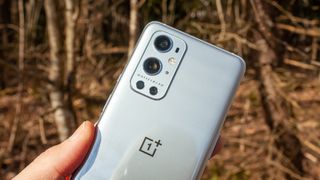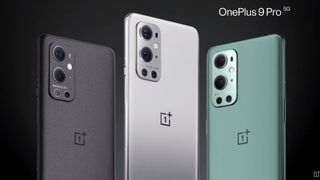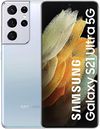
The OnePlus 9 Pro has been announced, which means we can finally square up one of the first big all-Android royal rumbles of 2021. How does it fare against the mighty Samsung Galaxy S21 Ultra?
We reckoned the Samsung Galaxy S21 Ultra to be the best smartphone on the market when it landed in early 2021. But if anyone knows how to give the great and mighty of the smartphone industry a bloody nose, it’s OnePlus.
What’s more, the OnePlus 9 Pro has a few smart tricks of its own to stir into the mix. So let’s see how two of the biggest phones of 2021 fare in a straight fight.
OnePlus 9 Pro vs Samsung Galaxy S21 Ultra price and availability
The Samsung Galaxy S21 Ultra made an earlier-than-expected appearance on January 29, 2021. The entry-level 128GB model starts at $1,199 / £1,149 / AU$1,849, while the 256GB model costs $1,399 / £1,349 / AU$2,149. The 512GB model increases that price to a staggering $1,599 / £1,549 / AU$2,449.
All of which makes the OnePlus 9 Pro seem almost reasonably priced, despite the fact that it’s more expensive than last year’s OnePlus 8 Pro. The 8GB of RAM / 128GB model will set you back $969 / £829, while pushing to 12GB/256GB with cost $1069 / £929.
This means that the top OnePlus 9 Pro model will cost you less than the bottom Samsung Galaxy S21 Ultra. That’s worth taking into consideration while we dive through the comparative specs.
Design
We described the Samsung Galaxy S21 Ultra in our review as “one gorgeous-looking smartphone”. While the OnePlus 9 Pro is a well put together piece of kit, it simply isn’t interesting enough to warrant the same level of praise.
Get daily insight, inspiration and deals in your inbox
Sign up for breaking news, reviews, opinion, top tech deals, and more.
It’s very much business as usual after 2020’s sleek, professional OnePlus 8 Pro. You get a similar glass and aluminum build, with subtly rounded edges to the the display and the rear panel. OnePlus has tinkered with the camera module, making it stick out less before squaring it off and repositioning it in the left hand corner.
It’s a more elegant solution, but it’s nothing like as imaginative or downright attractive as the Galaxy S21 Ultra’s swooping, smoothly integrated camera unit. There’s much to be said for the Galaxy S21 Ultra’s signature Phantom Black finish, too. Not only its it stealthy and classy-looking, but its matte finish minimizes fingerprints and smudges.


By contrast, the OnePlus 9 Pro’s headline Morning Mist finish has a hyper-reflective aspect that soon picks up greasy prints. It’s quite cool how this reflective effect lessens towards the top of the rear section, though.
You can also grab the OnePlus in Forest Green and Stellar Black, which are more matte shades. The Galaxy S21 Ultra, meanwhile, offers up a wider selection of Phantom Silver, Phantom Titanium, Phantom Navy, and Phantom Brown options.
While it might be easier on the eye, the Galaxy S21 Ultra is a lot heavier on the pocket. And we’re not referring to that higher price tag.
The OnePlus 9 Pro measures up at 163.2 x 73.6 x 8.7mm, while the Samsung Galaxy S21 Ultra is 165.1 x 75.6 x 8.9mm. That’s not a massive difference, but far more consequential is the weight gap. At 228g, the Galaxy S21 Ultra is a total lump, while the OnePlus 9 Pro just about feels manageable at 197g.
One other design win for the OnePlus lies with its signature physical alert switch, with sits on the right edge. Being able to change between silent, loud, and vibrate without messing around in the menus is an all-too-rare provision on Android.
Both phones have an IP68 rating, so they’ll stand up to water immersion and dust ingress equally well.
Display


It’s always difficult when comparing two of the best phones on the market. How do you separate the fantastic from the superb - or in this case, the Pro from the Ultra?
The Samsung Galaxy S21 Ultra screen is ever so slightly larger at 6.8-inches versus 6.7-inches for the OnePlus 9 Plus. But they’re both punchy AMOLEDs, and they both run to both 120Hz and a QHD resolution simultaneously.
Both phones apply LTPO technology in order to apply a variable refresh rate. This means that they can conserve power by scaling back from 120Hz when viewing static images or text. But while the Galaxy S21 Ultra can drop to 10Hz, the OnePlus 9 Pro can drop as low as 1Hz.
On the other hand, we can definitively state that the Samsung gets a little brighter, with a peak figure of 1500 nits literally outshining the OnePlus’s 1300 nits.
One other difference comes from the type of in-display fingerprint sensor these two phones use. The OnePlus 9 Pro uses a more traditional optical method, which isn’t as advanced or secure as the Galaxy S21 Ultra’s ultrasonic method. However, it is quicker and generally less prone to rejection in our experience.
Still, Samsung has improve things with this current generation, thanks to the provision of 1.7x greater surface area.
Camera

While Samsung has been making great camera phones for years, OnePlus only really entered the photographic big league with last year’s OnePlus 8 Pro. The OnePlus 9 Pro suggests it’s here to stay.
Both the Samsung Galaxy S21 Ultra and the OnePlus 9 Pro take great shots in a variety of situations, but they take quite different approaches to that mastery. While the Galaxy S21 Ultra is the zoom king, the OnePlus 9 Pro goes all in with a strikingly capable custom main sensor and some eye-catching video capabilities.
Starting off with the headline components, the Samsung Galaxy S21 Pro throws all of the pixels at the wall with a whopping 1/1.33“ 108MP main wide sensor. By contrast, the OnePlus 9 Pro goes with a custom 1/1.56” 48-megapixel Sony IMX789 sensor. Both use pixel binning to create crisp, bright 12MP images, though of course the Samsung packs the information from even more surrounding pixels (nine) into one.
That pixel difference swings back the other way when you consider the respective ultrawide solutions. The Galaxy S21 Ultra goes with a 1/2.55“ 12MP ultrawide, while the OnePlus 9 Pro goes with a 1/1.56” 50MP sensor. The latter also features a freeform lens, which greatly cuts down on the distortions that plague most ultrawides without resorting to the usual image processing work-arounds.
Continuing the tit-for-tat, Samsung shoots for the moon with two 10MP telephoto sensors. One of those offers a fairly standard 3x optical zoom, but the other goes further with a 10x ‘periscope’ zoom. By contrast, the OnePlus 9 Plus just has a single 8MP telephoto lens, which can zoom in up to 3.3x. This is accompanied by a 2MP monochrome lens, which will enhance your black and white shots.
While Samsung’s distinctively punchy color science continues to divide opinion (those reds are RED), OnePlus has taken steps to advance its own more natural eye by teaming up with Hassleblad. Shots with the OnePlus 9 Pro certainly manage to pop without looking uncanny. Both phones can capture 12-bit RAW shots, should you wish to get serious in their manual modes.
The OnePlus 9 Pro’s main sensor also supports Digital Overlap High Dynamic Range (DOL-HDR), which effectively shoots one shot at a short exposure and one at a long exposure simultaneously, rather than consecutively. This is potentially a massive boon for dynamic range, especially when it comes to video content.
Indeed, the OnePlus 9 Pro would appear to have the edge in video shooting. It can manage 8K video at 30fps versus the Galaxy S21 Ultra’s 24fps, and it also crops in less thanks to an unusual 16:11 aspect ratio. Meanwhile, only the OnePlus 9 Pro can shoot 4K video at 120fps (the Samsung only hits 60fps) for proper 4K slow-mo.
Samsung would seem to have the selfie category sewn up, thanks to a 40MP front-facing camera. The OnePlus 9 Pro has a 16MP equivalent.
Specs and performance

If you’re reading this in the US, then performance is pretty much all square between the OnePlus 9 Pro and the Samsung Galaxy S21 Ultra.
You lucky people will find that both phones run on the Qualcomm Snapdragon 888 processor, which is as fast as Android hardware gets right now.
In fact, the Samsung takes a slight edge here thanks to its generous memory allotment. While the OnePlus 9 Pro is backed by either 8 or 12GB of LPDDR5 RAM, the Galaxy S21 Ultra packs 12 or 16GB of the same.
If you don’t live in the US (or China), then the OnePlus 9 Pro takes a small but clear performance edge. That’s because the global model of the Galaxy S21 Ultra employs Samsung’s own Exynos 2100 chip instead, which isn’t as fast. That said, this difference isn't as notable as it has been on previous Samsung phones.
Outside of benchmarking, of course, we would defy anyone to spot the difference in performance from general usage. These are two speedy phones, and no task or game can really stretch them.
Talking of games, OnePlus is making a lot of its improved custom vapor chamber cooling system, which promises to prevent overheating (and subsequent throttling) during gaming sessions. Early tear-downs of the Galaxy S21 Ultra seem to suggest that Samsung has moved away from using such a vapor chamber, shifting instead to a graphite solution.
One thing the Galaxy S21 Ultra gives you more of is storage options. You can grab one with 128GB, 256GB, or 512GB of internal capacity, whereas the OnePlus 9 Pro only comes with 128GB or 256GB. Neither phone has a microSD slot.
Another edge for the Galaxy S21 Ultra - depending on your particular usage habits - is support for the S Pen. Samsung’s stylus standard has evolved over the years to be the best at what it does, with some powerful software that can really bring your doodles and hand-written notes to life.
Software in general is another point of difference that’s tricky to judge. Both interfaces present powerful, fluid operating systems, along with the exact same access to the Google Play Store. Samsung’s One UI has its fans, and it’s certainly improved dramatically over recent years. It undoubtedly offers more options for power users and tinkerers, while Oxygen OS on the OnePlus 9 Pro is cleaner, less cluttered, and more cohesive.
Battery

Samsung’s phone has a 5000mAh power pack compared to the OnePlus handset’s 4500 mAh equivalent, which probably accounts for its greater weight. The Samsung Galaxy S21 Ultra’s display is a tad bigger and brighter, of course, while the OnePlus 9 Pro’s LTPO screen can dip to a lower refresh rate.
Ultimately, both of these phones are single dayers. They’ll both get your through a full day of moderate usage without causing you to break out in a sweat or flick on their respective battery saver modes. But don’t expect to get far into a second day of usage here - especially not with a QHD resolution and 120Hz refresh rate ticking away together.
We’d possibly give the Galaxy S21 Ultra the edge due to its greater capacity here. But when it comes time to recharge, the OnePlus 9 Pro hits back hard.
Not only does the OnePlus 9 Pro actually come with a charger in the box, but it’s a monster of a 65W brick that will get you from 1 to 100% in just 28 minutes. The Galaxy S21 Ultra only supports up to 25W wired charging, which will get you to about half that amount in the same time.
That advantage extends to wireless charging too, with the OnePlus 9 Pro supporting up to 50W. The only downside: you’ll need to buy a specific charger from OnePlus, which isn’t cheap. By comparison, though, the Galaxy S21 Ultra only supports up to 15W wireless charging.
Takeaway
Samsung created the the first big hitter of 2021 with the Samsung Galaxy S21 Ultra, and it continues to be a formidably complete package. Some people may just start to question its value in light of the OnePlus 9 Pro’s arrival, however.
The Galaxy S21 Ultra is in contention for the best-looking phone on the market. As neat and tidy as the OnePlus 9 Pro is, its own design is too safe to enter into that conversation. For almost everything else it’s a toss-up, with both phones sporting their own unique highlights.
The Galaxy S21 Ultra continues to be the zoom camera king, with the kind of optically enlarged snaps that verge on the magical. But the OnePlus 9 Pro hits back with supremely well balanced and detailed wide and ultrawide shots, not to mention some snazzy video tricks.
Performance is broadly similar, while the Galaxy S21 Ultra’s greater battery capacity is offset by the OnePlus 9 Pro’s phenomenally fast recharging. Both UIs will have their defenders too, whether you prefer Samsung One UI’s power-user scope or OnePlus Oxygen OS’s refined purity.
Where the OnePlus 9 Pro scores a clear and potentially decisive win is with a price tag that’s hundreds of dollars less than its bulky rival. For two such remarkably complete phones, it could all come down to the money for many.
Most Popular








